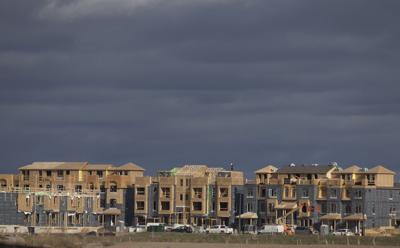Ontario’s real estate consumer watchdog says it is facing the “largest claim event” in its history, with the organization expecting to oweÌýmore than $90 million to home buyers this year as builders walk away from home and condo projects.
In its 2024 business plan, Tarion said the claims are expected for deposits from homebuyers who purchased homes or condos from builders that either cancelled projects or were operating illegally, and didn’t comply with warranty legislation.
The anticipated payout comes after a perfect storm of high interest rates, rising construction costs and an ongoing labour shortage that has led builders to abandon projects or seek bankruptcy. The gross claims projection of $90 million has prompted Tarion to enhance consumer protections and provide more stringent monitoring of bad actors in the industry, which one consumer advocate says is “sorely needed.”
By law, builders must provide a warranty on all new homes built in Ontario, and Tarion has a mandate to ensure buyers of newly-built homes receive the coverage they’re entitled to. But if a builder fails to deliver a home to the purchaser and can’t refund the purchaser, a deposit claim can be made by the purchaser to Tarion for the return of the deposit.
Previously, Tarion’s deposit payouts were significantly lower. From 2019 to 2021, annual deposit refunds ranged from $1.2 million to $1.6 million. In 2022, the annual total increased to almost $7 million.
Despite the huge increase, the organization says it will be able to cover valid claims.
“Tarion will be able to pay the deposit claims that are covered under the warranty program,”ÌýAndrew Donnachie, Tarion’s manager, media and stakeholder relations, said in aÌýstatement to the Star.
“The majority of these claims would not be covered by home warranty programs in other provinces, and the fact that the homeowners will receive some protection in Ontario demonstrates the value of the provincial program.”
The $90 million total estimates the gross impact ofÌýanticipated deposit protection claims in connection to a number of vendor companies in 2024, he added.Ìý
If a buyer signed their purchase agreement on or after Jan. 1, 2018, homes with a sale price of $600,000 or less have up to $60,000 of their deposit covered. Homes over $600,000 have protection coverage of 10 per cent of the sales price to a maximum of $100,000.
“For people that put down more than $100,000 deposit they will lose that money,” said consumer advocate Barbara Captijn.
“Most consumers don’t have the means to take this to court, they’re up against major builders.”Ìý
For developers, the deposit loss might not be a big blow, she said, but for families who put their life savings into their deposit the hit can be “catastrophic.”Ìý
“The consumer protection organizations are falling short of their obligations,” she added, by not educating purchasers on what the potential risks are, or vetting builders stringently enough.Ìý“More needs to be done to clamp down on these bad actors.”Ìý
The increase in claims comes during a reckoningÌýfor the homebuilding industry. As interest rates drastically increased in 2022 and 2023, as well as construction costs, it has becomeÌýmore difficult for builders to finance projects and make a profit, said Leor Margulies, real estate lawyer and partner at Robins Appleby. That has resulted in some builders abandoning projects or having to file for bankruptcy.Ìý
“We’re in a market where prices have dropped and it’s not economically viable to build,” he said.Ìý
Tarion did not provide information on how many builders have filed for bankruptcy, failed to complete projects, or built homes illegally, but there have been a number of high profile cases in the last year.
In 2023, a Star investigation found the developerÌýStateView Homes collected tens of millions of dollars in deposits for more than 450 homes that it did not have authorization to sell, bypassing the necessary measures to legally sell new homes.
Ìý
Tarion will want toÌýensure a claims event of this size doesn’t happen again, said Margulies.Ìý
In its business plan, the organization will work with the Home Construction Regulatory Authority (HCRA) to pursue appropriate sanctions against the builders involved.Ìý
“Tarion will continue to mitigate the risks of similar losses in the future by increasing homeowner and builder education and improving our underwriting approach,” Donnachie told the Star.
The HCRA, which is a provincial agency in charge of regulating new homebuilders and vendors, would not disclose what sanctions are pending, with spokesperson Tess Lin sayingÌýinvestigations are “ongoing and confidential.”
To better protect consumers for freehold properties, Captijn said TarionÌýshould follow similar deposit protection laws outlined in the Condominium Act, which requires condo builders to place all deposits in trust, meaning the deposit is protected. The same laws don’t apply for freehold buyers, “which is completely irresponsible,” she added.
“These purchasers don’t realize how exposed they are,” she said. “And the regulatory environment is too weak to protect consumers.”




























To join the conversation set a first and last name in your user profile.
Sign in or register for free to join the Conversation